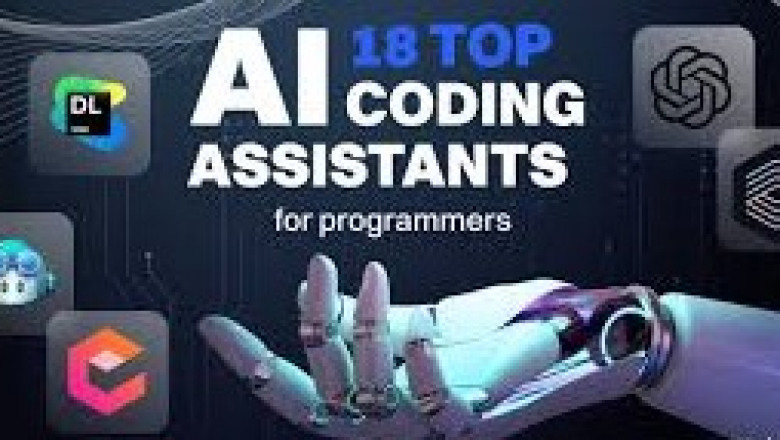views
Imagine having a smart coding buddy who’s always available, never gets tired, and helps you fix your bugs before you even realize they exist. That’s pretty much what an AI code assistant is. It’s a powerful tool designed to help developers write better code faster by suggesting, completing, and even explaining lines of code using artificial intelligence.
Why It's Gaining Popularity
With tech evolving at lightning speed, developers are under pressure to deliver more in less time. AI assistants are the answer to that call—boosting productivity while keeping quality high.
The Evolution of Coding Tools
From Text Editors to Intelligent IDEs
Not long ago, coding meant writing line after line in plain text editors like Notepad. Then came feature-rich IDEs like Visual Studio and IntelliJ. Today? AI is the brain behind the tool, making smart decisions alongside the coder.
The Rise of AI in Programming
AI has gradually seeped into everything, from chatbots to self-driving cars. Naturally, coding—being its creator—has also become one of its prime applications.
Key Features of AI Code Assistants
Autocompletion & Suggestions
Just like your phone suggests the next word, AI code assistants predict your next line of code—sometimes even whole blocks.
Bug Detection
No more chasing down that rogue semicolon. AI can spot syntax and logic errors in real time.
Code Refactoring
Need to clean up messy code? AI can suggest better ways to write it, improving readability and performance.
Multi-Language Support
From Python and JavaScript to Go and Rust, these tools understand a wide range of programming languages.
Documentation Generation
Hate writing documentation? Your AI buddy can summarize your code and auto-generate docs.
Popular AI Code Assistants in 2025
GitHub Copilot
Powered by OpenAI, Copilot is like autocomplete on steroids—suggesting code that fits the context of what you're writing.
Amazon CodeWhisperer
Great for AWS developers, it integrates perfectly with Amazon's ecosystem.
Tabnine
A privacy-focused assistant that works offline and supports custom training.
Replit Ghostwriter
Perfect for those working in browser-based environments.
OpenAI Codex
The engine behind many assistants, Codex is like GPT but for code.
Benefits of Using AI Code Assistants
Boost in Productivity
Spend less time Googling syntax and more time solving problems.
Enhanced Code Quality
Get best-practice suggestions that improve your coding standards.
Learning and Skill Development
New to a language? AI can teach you by example, showing you how pros write code.
Better Time Management
Less grunt work means more time to focus on features and innovation.
How AI Code Assistants Help Different Users
For Beginners
Coding for the first time can be overwhelming. AI assistants act like a personal tutor, guiding you through every line.
For Professionals
They’re a huge timesaver, reducing the mental load of routine tasks and letting you focus on architecture and problem-solving.
For Teams
Team collaboration becomes smoother when everyone’s code style aligns, thanks to AI-enforced consistency.
Challenges and Limitations
Accuracy and Reliability
AI isn’t perfect. Sometimes it suggests code that doesn’t work or isn’t optimal.
Security Concerns
Sensitive data can accidentally leak through AI-generated suggestions. Always audit the code!
Over-Reliance on AI
Relying too much can stall your personal growth. Use AI as a helper, not a crutch.
AI Code Assistant vs Human Developer
Can AI Replace Developers?
Not yet. AI can generate code, but it lacks creativity, domain knowledge, and the ability to truly innovate.
Where Human Creativity Still Wins
Designing architecture, thinking abstractly, and understanding user needs—those are still uniquely human strengths.
Ethical Concerns and Open Source
Intellectual Property Issues
Sometimes AI suggests code from copyrighted sources. Know the rules before you copy-paste.
Attribution of AI-Generated Code
Who owns the code? The user, the AI, or the platform? This is still a gray area.
Tips for Using AI Code Assistants Effectively
-
Always review the code.
-
Use AI suggestions as teaching moments.
-
Tailor settings to your workflow and coding style.
AI Code Assistants in Education
Classrooms are changing. Instead of memorizing syntax, students now focus on logic and design, thanks to AI helpers that do the heavy lifting.
The Future of AI in Programming
We’re heading toward a future where you describe an app in plain English, and AI writes it for you—think full project automation.
Industries Benefiting from AI Coding Tools
Software Development
Faster prototyping, fewer bugs, better products.
FinTech and Healthcare
Secure, efficient code with fewer vulnerabilities.
Startups and Small Businesses
Reduced need for large dev teams, yet still agile and innovative.
Integration with Development Workflows
AI tools now plug right into your existing stack—whether it’s GitHub, Docker, or AWS, making them seamless to use.
Conclusion
AI code assistants are changing the game—not by replacing developers, but by empowering them. Whether you’re just starting out or a seasoned pro, these tools help you code smarter, not harder. Like any tool, they’re best used wisely—with a mix of trust and skepticism. The future is bright, and the keyboard just got a lot more powerful.
FAQs
1. What programming languages do AI code assistants support?
Most support popular languages like Python, JavaScript, Java, C++, and more, with growing support for niche languages.
2. Are AI code assistants suitable for beginners?
Absolutely! They offer guidance, suggestions, and error corrections perfect for those just starting out.
3. Is it safe to use AI-generated code in production?
Yes—but always review and test the code thoroughly before deploying it.
4. Can AI code assistants replace human developers?
No. They’re great assistants, but they lack human creativity, critical thinking, and real-world understanding.
5. What’s the future of AI in coding?
Expect tools that write full applications based on natural language, smarter debugging, and even AI pair programming.














Comments
0 comment